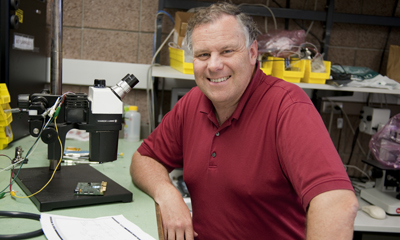Faculty Mentorship Spotlight: Forrest Brewer

Faculty Mentorship: Interview with Forrest Brewer
ECE and CE Professor
Interviewed for the Fall 2013 ECE Current newsletter
As a student, did you have great faculty support?
I was really fortunate. I was in Physics during my time as an undergrad and got exposure to Dick Feynman at Cal Tech., which was more than inspiring, it was life changing. I learned a great deal and it greatly influenced my decision not to stick with physics. In graduate school, that had something to do with why I was more interested in doing other things such as architecture and engineering.
There are always students lined up outside your door — could you tell us more about that?
It’s hard to say. I think it has a lot to do with my lecturing style, which some of my students have compared it to standing in front of a fire hose. I’m not so sure that’s a good thing or a bad thing. For many students, I think things go a little fast and they’re much happier in a personal setting to ask what’s going on. The hope is that, with the way the lectures are delivered, even the people that are really sharp will see things that they should be asking about because there’s more stuff behind that. I hope that they get something out of it. I do take the time to talk with them because I regard it as one of the more important things I do, it’s my first job here. I love to do research but I’m not going to leave people in the cold to make that happen.
Describe the work you do as faculty sponsor of the IEEE group
IEEE is a student group and my job is mostly to provide an interface to the faculty for when there’s an issue of some kind. One thing I have to do is to clue the people in at the end of the summer to start planning on getting people to join IEEE in the fall because new blood is the only way our organization survives. IEEE has literally grown from five to seven people to around forty due-paying members now. There’s a class on microcontroller design that I run as an independent study. I also provide resources. We scrapped a bunch of computers down in the lab and I convinced people that maybe a few of those should go to IEEE because they need work stations. IEEE sees itself as a kind of learning and craft organization. It’s a way of getting students together to build things and students end up learning a lot. Whether they get it from classes or whether they get it from IEEE, it’s still part of the university experience, kind of a label.
Describe the work that you do as a faculty adviser for undergrad students
I spend a lot of time doing that. Undergrads have an even greater need for advising and you kind of owe it to them to talk about things as simple as study habits. You realize students have weaknesses but the weaknesses aren’t necessarily obvious and it helps to sound them out. The fact that somebody cares, may actually surprise them. You want to make sure that they carry away from here the seeds of what will get them a little bit through life. The reality is that engineering is sort of a master level thing and leaving with a bachelor’s degree is always going to leave holes. You have to select which holes you want to leave and talk to people if you want to become a professional engineer. They really need to think about grad school a little bit and what are their options are and what they can do.
Do you keep in touch with any of your former students?
The ones that stuck out or got a PhD or advanced degrees definitely. But even a lot of undergrads will come back and talk to me or I’ll see them at some place or run into them at an airport. You also have people come by asking if there’s someone that does a certain kind of thing and you’ll realize that maybe there’s a connection you can forge with a former student so inadvertently you’ll rebuild those bridges. It’s kind of a nice thing actually, having students out in the real world.
Do you have any general advice for ECE students?
I’d say one thing is that if you were away from a subject for about six months and presumably have forgotten much of what you had learned in a class, then spend a little bit of time reviewing. Not necessarily doing homework, just reviewing the high points, looking for connections about how you currently think about things. You can essentially retain twice as much. That makes your education twice as valuable and it doesn’t take a huge amount of time.